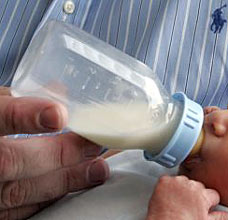Cancer alert over tin can and plastic bottle chemicalBy FIONA MACRAEDaily Mail Aug. 27, 2006 |
Popular 
FL State Sen. Randy Fine Celebrated Israel Killing an American - Trump Just Endorsed Him For Congress

Poll: 57% of Americans Support Trump Starting Program to Deport All Illegal Immigrants

Trump Nominates Pam Bondi for Attorney General

Netanyahu Cries 'Antisemitism' After International Criminal Court Issues Warrant for His Arrest

Matt Gaetz Withdraws from Consideration as Attorney General
  A gender-bending chemical found in babies' bottles and tin cans may cause breast cancer, scientists have warned. A gender-bending chemical found in babies' bottles and tin cans may cause breast cancer, scientists have warned.Bisphenol A, used in the manufacture of CD cases, lunchboxes, sunglasses, water bottles babies' bottles and tin cans, has been linked to health problems ranging from cancer to miscarriage and infertility. Industry has previously claimed the chemical is broken down by the body, making it safe to use. But new research casts doubt on this, with experiments showing the chemical remains carcinogenic. The research has reignited calls for the compound - a manmade version of the female sex hormone oestrogen - to be banned. The scientists looked at what happens to bisphenol A inside the body and whether it affects the growth of breast tumours. They found that while the chemical is initially broken down, chemicals produced by cancerous tumours can lead to it quickly returning to its original state. Once back to normal, the chemical can go on to speed up the growth of the tumours. Researcher Dr Theodore Widlanski said: "Enzymes present on the surface of breast tumour cells appear to convert the modified bisphenol A back into bisphenol A." The Indiana University biochemist said the results meant he was unable to give the chemical a clean bill of health. "We set out to show the opposite, that bisphenol A is not harmful," he said. "If the answer to any of our questions had been 'no', then we would have concluded bisphenol A was not dangerous. But we can't do that, or we can't do it yet." Advising pregnant women and those with hormone disorders to be particularly wary of the chemical, he said: "It doesn't mean that your bottled water is any less safe today than it was yesterday. Industry profits "It just means that if it isn't safe, we might be able to explain why." He added that was unlikely that bisphenol A was 'the only culprit' in causing or speeding up breast cancer. Instead, it is probably one of a cocktail of cancer-causing chemicals. The experiments - which were been done in the test-tube, rather than in the body - looked at the effects of levels of bisphenol A similar to those the average person would be exposed to over their lifetime. The findings, published in the journal Chemistry & Biology, have alarmed British experts, who called for industry to re-think its stance. Gwynne Lyons, a World Wildlife Fund chemicals expert, said: "This should be another nail in the coffin for bisphenol A. It is well known that this substance can derail oestrogen, the female hormone, and evidence for a potential role in breast cancer is now mounting. "Unfortunately, proof will be very difficult to achieve, and regulators seem more concerned with industry profits than protecting our health." There is also evidence that synthetic oestrogens affect the environment, leading to fish changing sex and snails' reproductive systems going into overdrive. DES, a pregnancy drug similar to oestrogen, has been linked to a string of health problems, including cancer an infertility. |



